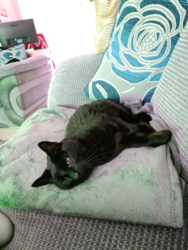Sorry, have to disagree. After watching the BBC series on the movement of cats,
I honestly think that the cats in countries like the UK - where not only is it the culture to let them roam but also (relatively) safe to do so, are
different mentally (and some of them definitely different physically) to those in - especially - the US, and also other countries where for a range of reasons it has not been the culture to permit free-ranging, but rather to keep them largely or even entirely indoors.
Cats are fast breeders and in the US, most kittens will probably be descend from many generations of indoor, or at least partially, indoor cats, which have thrived in that environment. It seems to be largely the cats that are mentally 'ready' to live and thrive with an indoor lifestyle - be they 'breed' or 'moggie' - that get successfully bred and passed on, or sold, to other indoor-only owners; in the UK our cats - definitely the moggie and to some lesser extent the breeds - are more 'multi-purpose' as it were.
Also not to forget that coyotes are often city dwellers in the US now, rather like foxes in the UK, and find cats and small dogs to be an easy dinner; even in suburban areas one hears of bears and cougars; there are poisonous snakes and of course with every interaction that a cat has with another mammal there is a rabies risk. Caiman in Florida too - and probably trigger-happy folks in every alternate back-yard; your pet wouldn't get a bucket of water thrown at it as happens here but a hail of bullets.
So no wonder that indoor cats are a 'thing' in the US. It's probably not strictly
necessary , in that unneutered cats in a semi-protected environment (eg a farm) would likely breed fast enough to maintain their population despite a combination of predators and disease, but it's human nature to treasure the thing one has nurtured and want to protect it, so cats will have been - even if not deliberately - bred to 'accept' a more indoor life than here; many US cats would just be confused and stressed by being expected to go outside to occupy and entertain themselves, and to do their business - and how
do they do it when there's 6ft of snow outside for several months of the year as in some parts of the US? Also not to forget that an indoor cat in the US will generally have much greater range than an indoor one in the UK - apparently 6 average UK houses could fit inside one average US house!
There's an additional issue, exclusive to the US, in rehoming cats from a rescue, that in the US (alone among almost all of the developed world, I believe) it is still legal to perform onychectomy/phalangectomy (partial digital amputation - approximately equivalent to cutting off the fingers at the fingers at their first joint - and euphemistically known as declawing) for reasons of owner's 'convenience'. A cat without its claws has no defence and is basically helpless in the face of even the mildest aggression from eg another cat or a small domestic dog, and must not be allowed out for its own safety.
So I think that when we compare UK domestic cats with US domestic cats, although on the surface we think we are comparing like with like, in actual practice I think we are comparing two creatures and two lives which are more different than we know. One is not 'better' than the other, but one creature is adapted to one lifestyle and the other, to the other.
Neither is likely to thrive if suddenly expected to cope with 'the other' without an adequate period of transition, and even then it may well not be possible for it to adapt.

 Lyndon Avenue area.
Lyndon Avenue area.




